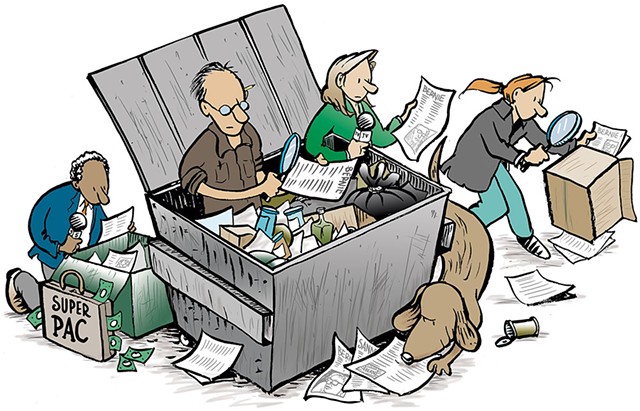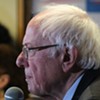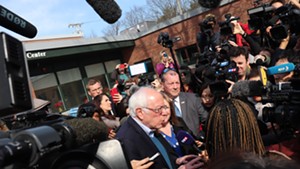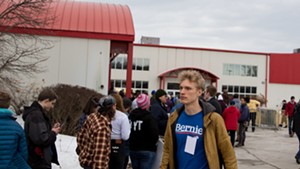
- Tim Newcomb
As Sen. Bernie Sanders (I-Vt.) has become the front-runner for the Democratic presidential nomination, rivals and skeptics have warned that revelations about his past could destroy his chances in a matchup against President Donald Trump.
"The opposition research on @BernieSanders could fill @realDonaldTrump's empty Foxconn facility in Wisconsin," former New York City mayor Michael Bloomberg's campaign manager, Kevin Sheekey, wrote on Twitter last week. "It is very damaging, perhaps even disqualifying."
Sheekey was just the latest Sanders critic to argue that the senator's record and fitness for office have never truly been examined. They contend that, during his first run for the presidency in 2016, Sanders got a pass because neither Hillary Clinton nor the journalists who covered the race saw him as a serious contender.
But those who know his record best don't buy the notion that, after half a century in public life, Sanders remains unvetted.
"That's absurd," said Lauren-Glenn Davitian, executive director of the Burlington-based community television station CCTV/Center for Media & Democracy. "There is nothing secret about Bernie frickin' Sanders."
Related Bernie's Journey: From 'Sanders the Socialist' to White House Contender

Davitian is well acquainted with the record. Since she cofounded CCTV in 1984 — three years into Sanders' tenure as mayor of Burlington — the station has produced and collected more than 1,000 hours of footage featuring the future senator. And since he first publicly mulled a presidential campaign in 2014, Davitian has watched journalists pore through the tape in search of scoops. (Ironically, the footage exists in part because Sanders championed the transparency that public access TV brought to municipal government.)
As early as June 2015, Seven Days spotted a pair of opposition researchers combing through Sanders' mayoral records at the University of Vermont's special collections library. Since then, according to UVM librarian Chris Burns, there's been "a steady stream" of reporters and political operatives availing themselves of the archives. "I wouldn't describe it as overwhelming, in part because he's gone through a couple of these cycles," Burns said.
Among the visitors, no doubt, were members of the Clinton campaign. In November 2015, her research director circulated six documents to top staffers containing more than 1,000 pages of Sanders "oppo." After the Russian government hacked into campaign chair John Podesta's email account and provided its contents to WikiLeaks, the research became widely available online for journalists and future Sanders opponents to peruse.
The documents describe a litany of Sanders' "past extreme views," such as his support in the 1970s for the legalization of all drugs and a 100 percent marginal tax rate for income over $1 million. They allege that he flip-flopped on gun rights, immigration and gay marriage. The documents chronicle a series of alleged ethical improprieties that financially benefited members of his family. And they summarize strange essays he wrote in the '70s involving rape fantasies and a theory that sexual maladjustment causes breast cancer.
Sanders distanced himself from the essays in 2015, but this week they reemerged on cable television. "Bernie has all of this loopy stuff in his background," Bloomberg senior adviser Timothy O'Brien said Tuesday on CNN. "Why has this stuff not been surfaced? He's written about women's rape fantasies. That hasn't been surfaced. That's the loony side of Bernie."
Though the Clinton research has surely informed many news stories, it wasn't used as the basis for attack ads in 2016. As former Clinton aide Zac Petkanas wrote for NBC News last year, his former boss "never named [Sanders] in a single negative television or digital ad."

- File: Rob Swanson
- Bernie Sanders
Until recently, Sanders' 2020 rivals largely ignored him and instead targeted such early front-runners as former vice president Joe Biden, Sen. Elizabeth Warren (D-Mass.) and Sen. Kamala Harris (D-Calif.). Now that Sanders has won two early-voting states and tied the third, he's beginning to face the kind of scrutiny he previously avoided.
On Monday, Bloomberg released a digital ad highlighting Sanders' evolving position on gun rights and the support he received from the National Rifle Association during his 1990 campaign. CNBC reported that Bloomberg is planning "a multi-pronged attack, including the publication of opposition research on Sanders." Biden, meanwhile, released a digital ad accusing Sanders of Democratic disloyalty for contemplating a primary challenge to president Barack Obama in 2012. And on Tuesday night, Sanders' opponents were expected to unload on him at a debate in South Carolina.
Related Stickin' to His Guns? The NRA Helped Elect Bernie Sanders to Congress. Now He's Telling a Different Story.

According to Mike Casca, a spokesperson for Sanders, there's nothing new about the attacks. "Sen. Sanders' opponents have thrown everything they can at him since the launch of his campaign," Casca said. "They've failed to stop the movement to build a political revolution because of the senator's consistent, lifelong record of standing with the working class."
Stuart Stevens, a veteran GOP operative and part-time Vermonter, said he doubts Sanders' foes will discover some silver bullet. "Had there been something that was disqualifying per se, it would have come out," he said.
But when other Americans learn what Vermonters already know about their senator, Stevens argues, they might be less accepting. "I think voters in Vermont have kind of been acculturated to Bernie Sanders," he said. "He's eccentric. And I wonder, when people start to really focus on him, is this guy going to seem like a president?"
Sanders' warm words for Latin American leftists, for example, are no secret to Burlingtonians. But after 35-year-old footage of Sanders defending Fidel Castro aired on "60 Minutes" on Sunday, Florida Democrats — some allied with Sanders' foes — warned that his nomination could cost them their seats. (The clip came from a 1985 CCTV interview with Davitian.) They appeared less concerned by the original remarks than his unwillingness to amend them.
"As the first South American immigrant member of Congress who proudly represents thousands of Cuban Americans, I find Senator Bernie Sanders' comments on Castro's Cuba absolutely unacceptable," first-term Rep. Debbie Mucarsel-Powell wrote Monday on Twitter, calling Castro a murderous authoritarian.
Sanders' past praise for Castro and Nicaraguan president Daniel Ortega are already featuring in his opponents' efforts to paint him as a dangerous radical. "Fidel Castro left a dark legacy of forced labor camps, religious repression, widespread poverty, firing squads, and the murder of thousands of his own people," Bloomberg wrote Monday on Twitter. "But sure, Bernie, let's talk about his literacy program."
Trump has made clear that he will engage in red-baiting tactics if Sanders wins the nomination.
Sanders' case likely wasn't helped last Friday when the Washington Post reported that intelligence officials believe the Russian government is seeking to assist his candidacy. (The New York Times had previously reported that the Russians were attempting to reelect Trump.) "Wouldn't [Russian President Vladimir Putin] rather have Bernie, who honeymooned in Moscow?" Trump asked at a rally last Friday in Las Vegas.
Related Sanders Condemns Reported Russian Support for His Campaign

The president was referring to Sanders' 1988 journey to the Soviet Union with his new bride, Jane O'Meara Sanders, and a delegation of Burlington officials. The trip gained notoriety last year when a two-minute video went viral showing the shirtless and inebriated crew singing "This Land Is Your Land" to their Russian hosts.
CCTV has in its archives a full three and a half hours of footage from Sanders' Soviet adventure but refuses to digitize and make it publicly available. "No, because it didn't air on television, so we're not distributing it," Davitian explained. The station is willing to show it to those who stop by its Burlington headquarters. Politico, Mother Jones and the Washington Post have all sent reporters to view and write about it.
This would hardly be the first election in which the senator's patriotism is questioned. During Sanders' first successful run for Congress in 1990, Republican incumbent Peter Smith ran a blistering TV ad linking him to Castro and referring to an interview in which Sanders said he had been "physically nauseated" by the late president John F. Kennedy's inaugural address.
But according to former Sanders campaign manager Phil Fiermonte, such attacks have never gained much traction. "I think it's going to be pretty hard to muddy him up as some kind of crazy communist," Fiermonte said. "I think for folks that have tried it, they have found it very hard to make that stuff stick."
Stevens doesn't believe red-baiting is as effective as it once was. "We're in a world in which the Cold War and talking about Castro and Russia and the Soviet Union is sort of like, for a lot of these voters, talking about the Crimean War," he said. "It means nothing. Like, Paul McCartney was in a band before Wings. I don't think they care."
According to Rodolphe "Skip" Vallee, a longtime Sanders antagonist, the senator's real vulnerability may be answering tough questions about what's already known. "I don't think it's so much that Bernie hasn't been vetted," said Vallee, a Vermont gasoline dealer, Republican fundraiser and former ambassador to Slovakia. "It's more that he isn't asked or stiff-arms the press on obvious follow-up questions."
Last May, for example, Sanders declined an interview request for a New York Times story about his forays into Latin American politics in the 1980s. After it was published, he changed his mind and, during a phone interview, berated and belittled the reporter, Sydney Ember.
"I think, Sydney, with all due respect, you don't understand a word that I'm saying," Sanders said.
Some subjects he simply refuses to discuss.
The senator and his wife have never been fully pressed on the details of the financial transaction that led to a nearly two-year Federal Bureau of Investigation probe of O'Meara Sanders' tenure as president of Burlington College. The investigation stemmed from a January 2016 complaint by a Vermont Republican Party official alleging that she fraudulently inflated the size of pledged donations to the school in order to obtain a $6.5 million bank loan. Burlington College eventually collapsed under the weight of the loan.
The family has long maintained that O'Meara Sanders did nothing wrong, and in November 2018 it released a statement saying she had been informed by the U.S. attorney for Vermont that the case had been closed and no charges would be brought. But since Vermont reporters began writing about the loan in 2015, Sanders has largely frozen out the local press and refused to answer questions about the matter.
The Burlington College investigation is certain to come up during the 2020 campaign, and it's conceivable that Trump could seek to revive it. The Republican official whose complaint initiated the probe, Brady Toensing, now works for the Department of Justice. His mother and stepfather, attorneys Victoria Toensing and Joe diGenova, helped Trump lawyer Rudy Giuliani seek dirt on Biden in Ukraine.
Brady Toensing declined to comment and referred Seven Days to the DOJ press office, which did not respond to an inquiry.
Perhaps the most damaging issue that could haunt Sanders is his physical health — and his campaign's reluctance to answer questions about it. For days after the 78-year-old senator suffered a heart attack last fall, his staff downplayed the incident and refused to provide details. Sanders soon promised CNN's Sanjay Gupta that he would "make, at the appropriate time, all of our medical records public for you or anybody else who wants to see them."
In December, Sanders released letters from three physicians who declared him fit to pursue the presidency. But at a CNN town hall last week, he walked back his commitment to provide more information, arguing that he had released "quite as much as any other candidate has."
Though there's no uniform standard for what presidential candidates are expected to release, Sanders' reluctance raised questions that he might have something to hide.
Stevens, who opposes Trump's reelection, thinks the key to defeating him is making the election a referendum on the incumbent. He worries that, even if no single piece of opposition research dooms Sanders, an accumulation of it could make it easier for Trump to keep the focus on his opponent.
"Every hour they're not talking about Donald Trump is a win for them," Stevens said. "So I think [Sanders' potential nomination] is a disaster."














Comments (12)
Showing 1-12 of 12
Comments are closed.
From 2014-2020, Seven Days allowed readers to comment on all stories posted on our website. While we've appreciated the suggestions and insights, right now Seven Days is prioritizing our core mission — producing high-quality, responsible local journalism — over moderating online debates between readers.
To criticize, correct or praise our reporting, please send us a letter to the editor or send us a tip. We’ll check it out and report the results.
Online comments may return when we have better tech tools for managing them. Thanks for reading.